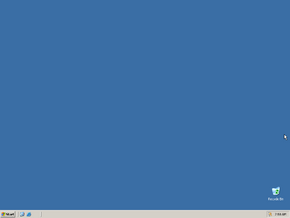Build list legend
Non-existent page
| Version of Microsoft Windows | |
 | |
| OS family | Windows NT |
|---|---|
| Version | 5.2 |
| Codename | Whistler Server |
| Preliminary name | Windows 2002 Server[1][2] Windows .NET Server Windows .NET Server 2003 |
| Architecture | x86, x64, IA-64 |
| Latest build | 5.2.3790.3959 |
| Release date | 2003-04-24 |
| Support end | 2015-07-14 |
| Client counterpart | |
| Windows XP | |
| Replaces | |
| Windows 2000 Server | |
| Replaced by | |
| Windows Server 2008 | |
Windows Server 2003 is a major release of Windows Server family, released to manufacturing on 24 April 2003. It is the server counterpart of Windows XP, although it was released nearly 18 months after its original release and is built on a slightly newer codebase (NT kernel version is 5.2). It was released in several editions, including Web Edition, Standard Edition, Datacenter Edition and Enterprise Edition. It replaces Windows 2000 Server and was eventually succeeded by Windows Server 2008.
Several other products were built on the codebase of Windows Server 2003, such as Windows XP 64-Bit Edition, Version 2003, Windows XP Professional x64 Edition, Windows Small Business Server 2003 and Windows Home Server.
Windows Server 2003 requires a processor with a speed of at least 550 MHz, at least 256 MB of RAM, 1.5 GB of hard drive space, a CD-ROM drive, and a Super VGA or better display adapter.
The first service pack of Windows Server 2003 was released on 30 March 2005. It features numerous enhancements in kernel, including AMD64-specific enhancements and re-adaptation of kernel functionality to be more compatible for bug fixing with PREfast utility, improvements in networking stack, integration of Windows Installer 3.1 and hot patching support. Also, several features were backported from Windows XP SP2, such as Windows Firewall, security updates and unifying of kernel branding.
Additionally, the SP1 release introduced AMD64 builds of several server editions and Windows XP Professional x64 Edition, which previously were hard to maintain and to use due to compiler issues and incomplete ports of functionality into AMD64 platform. Also this service pack's in-development version serves as the base for Windows Vista's Omega-13 and post-reset builds.
The kernel of this service pack is partially released as Windows Research Kernel for educational and research purposes in academies and universities.
Next service pack of Windows Server 2003 was released on 13 March 2007, and features mostly incremental improvements over first service pack. Most notable changes are integration of Windows Server 2003 R2's new features, introduction of Microsoft Management Console 3.0 (including new snap-ins) and Windows Deployment Services, replacing RIS (Remote Installation Services) and additional bugfixes on networking stack and in system overall.
An interim release between first and second service packs, called as Windows Server 2003 R2 was released to manufacturing on 6 December 2005[3], although unlike server versions with the R2 moniker that were in fact based on newer Windows versions, it was still built on the same codebase as the original version. The update included .NET Framework 2.0, Virtual Server 2005 and Windows Services for UNIX.
As well as the standard Windows Server 2003, several other editions were built on base of NT 5.2, including Storage Server 2003 (released on 10 September 2003),[4] Storage Server 2003 R2 (released on 6 March 2006), Compute Cluster Server 2003 (released on 9 June 2006), Small Business Server 2003 R2 (released on 1 September 2006) and Unified Data Storage Server 2003 (released on 5 December 2006).
There is a widespread misconception that a version of Windows Server 2003 for the United Kingdom used a different startup sound. However, all versions and localizations of Windows Server 2003 use the same startup sound as in Windows XP – furthermore, Windows was not available in the English (United Kingdom) language variant until the release of Windows 8 and Windows Server 2012.
On 23 September 2020, the source code for Windows XP Service Pack 1 and Windows Server 2003's RTM build was shared on 4chan's /g/ board. As mentioned on the original post, the code had been circulating in private circles for several years at most (date of initial leaked sources is 16 June 2012). Due to the incompleteness of both source code repositories, primarily within the activation functionalities, it is fair to assume that the disclosure had originated from a Microsoft Partner who had access to the source code, rather than Microsoft themselves. The ability to glance into the groundwork of this operating system has led to some discoveries, an example being the checks for enabling the DirectUI-based Start Page from shell\explorer\tray.cpp being usable in build 2410, preliminary server billboards and boot screens on Windows XP source code and introduction of AMD64 and ARM32 compilers initial versions in Windows Server 2003.
Build list legend